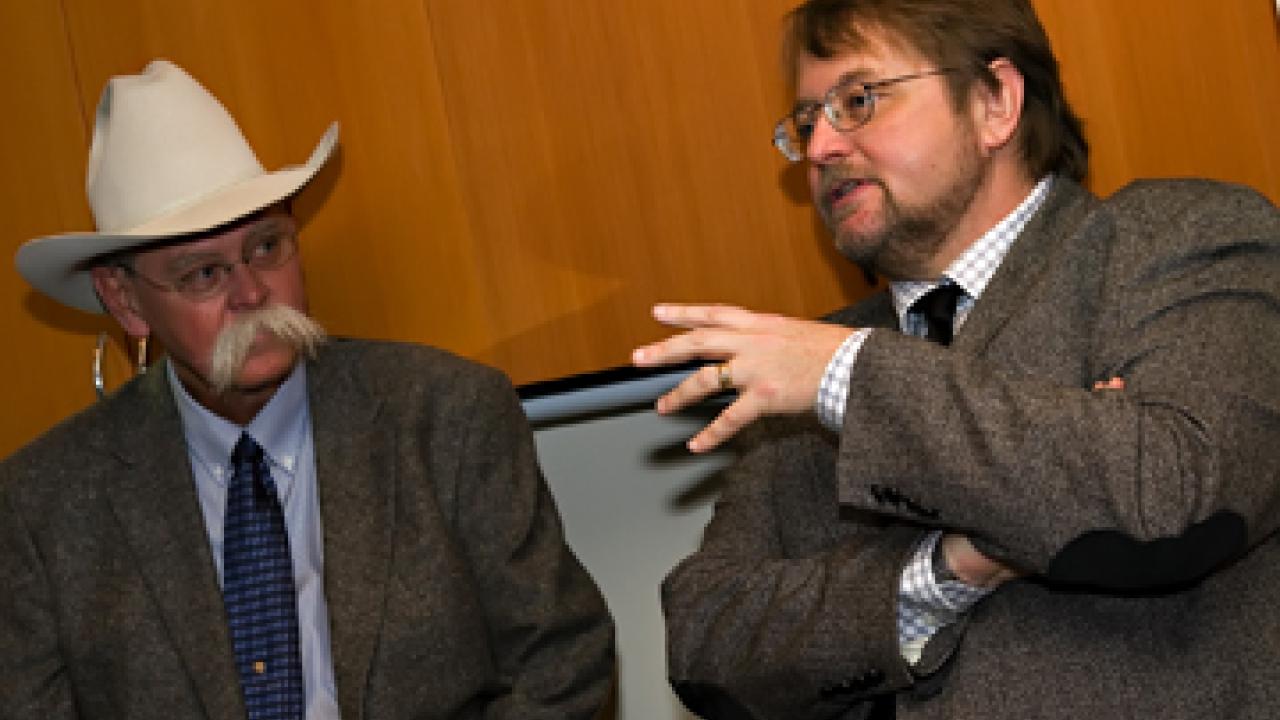The Devil's Highway author Luis Alberto Urrea says he grew up believing the U.S.-Mexico border ran through the middle of his house.
He was born in Tijuana, and grew up there and in Los Angeles and San Diego. His American mother, a pearls-and-white-gloves kind of lady from New York City, ruled half the house. His father, a Mexican army officer "insanely in love" with his homeland, ruled the other half. His mother did not speak Spanish; his father refused to speak English, even though he knew the language.
Urrea has come to learn that "the border is everywhere." He does not mean the boundaries between countries, of course, but the borders between people -- leading to the intense U.S. debate over immigration. For Urrea, there is no debating immigration's tragic toll, including the 14 Mexicans who died in the scorching heat of the desert Southwest during a border crossing in 2001.
The so-called Yuma 14 are the subjects of The Devil's Highway: A True Story, UC Davis' Campus Community Book Project for 2007-08. The author's two-day visit to campus in late November capped a long list of fall activities dealing with his book and its theme: immigration.
"I get mistaken for a political writer," Urrea told an audience of about 200 at a Nov. 28 panel discussion at the Mondavi Center for the Performing Arts. "But I'm a theological writer -- I'm concerned about the state of people's souls."
He found good souls in law enforcement officers like Ralph Ogden, an Arizona sheriff who joined Urrea on the Forum@MC panel. Urrea also noted the goodness of federal officers. "I always confess to people that I intended to do a job on the Border Patrol (in The Devil's Highway), but it didn't turn out that way.
"The border is not all about guns and violence and testosterone," he said, "but neighbors and brothers and sisters and loving each other."
The souls that worry Urrea are those of people who react based on "inflammation, not information," and sometimes exhibit racism, failing to see that immigration is a humanitarian issue -- and that people are dying for no reason. No, he does not want an open border, and yes, he understands why the United States must protect its borders.
But there also are good reasons for people to come to the United States, and plenty of potential in those who make it.
Take, for example, the son of one of the 12 survivors of that fateful border crossing in 2001. The survivors settled in the United States, where their families joined them, and one of the children is now studying economics in London.
Urrea said the young man plans to show "what a little illegal boy to the United States can accomplish."
Other families can only pray to be together in the United States, as they endure waits of five to six years for legal immigration. For other Mexicans, the wait can be forever -- because they are shut out by their lower-class status, the Forum@MC panelists agreed.
"The immigration issue is drawing lines between people and it's drawing lines between communities," said Julia Mendoza, a third-year law student who works in the law school's Immigration Clinic.
Mexicans have "a powerful incentive" to come to the United States, said agricultural and resource economics professor Philip Martin, another Forum@MC panelist.
He said an immigrant can earn in one hour in the United States what it would take him or her eight hours to earn in Mexico.
When the wait grows too long, or when all hope is lost for even getting in the immigration line, many Mexicans risk the treacherous border crossing known as the Devil's Highway, or anywhere else along the Mexico-U.S. border.
For those who die, people like Sheriff Ogden are called in to pick up the bodies — he estimated that he had dealt with more than 200 such deaths in his more than 30 years of law enforcement work.
"My name isn't Joe Arpaio and I'm not the sheriff of Maricopa County," Ogden said, referring to the Arizonan nicknamed "America's Toughest Sheriff."
Ogden is from Yuma County, and he wears a white hat. "We try desperately to work with people as victims and witnesses, no matter where they come from," he said during the Forum@MC.
He told of a recent crash in the desert, involving a single vehicle carrying a mother and her young son, U.S. citizens, who were on a camping trip. The woman was pinned in the wreckage, her little boy left to fend for himself.
Along came a Mexican man, crossing the border. He found the boy, wandering by himself, and arranged to get help for him and his mother -- but by then she could not be saved.
"What a heroic act," Ogden said. Sadly, he added, people called for the man's deportation because he was in the country illegally.
Ogden said his goal in life "is to get those people back there (in Washington, D.C.) off their butts so we can come up with some kind of law or policy that's fair to everybody."
Later, during Urrea's nighttime address to an audience of nearly 1,200 in the Mondavi Center's Jackson Hall, the author said: "I am for a humane solution. First and foremost, we must stop the death."
Media Resources
Dave Jones, Dateline, 530-752-6556, dljones@ucdavis.edu
